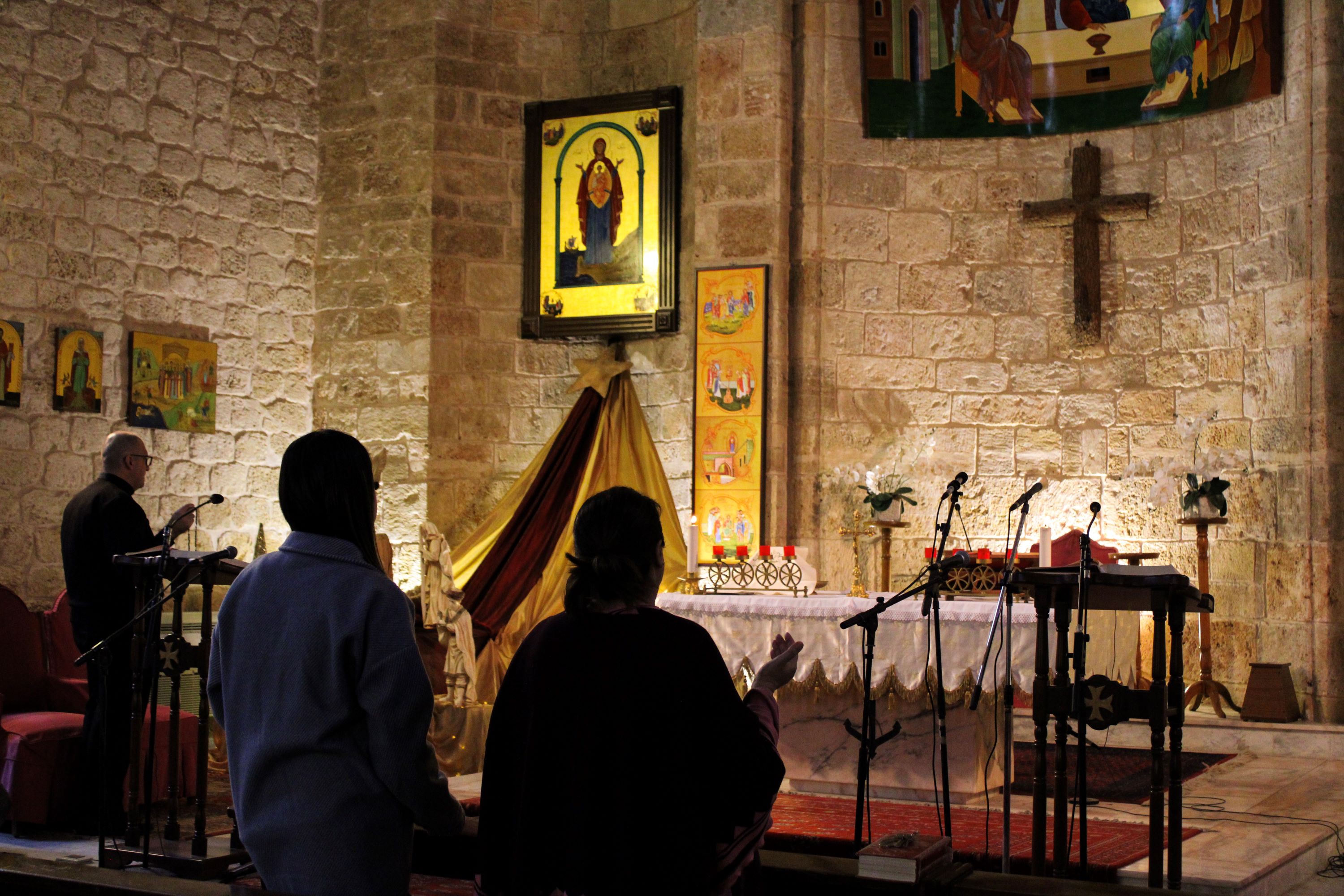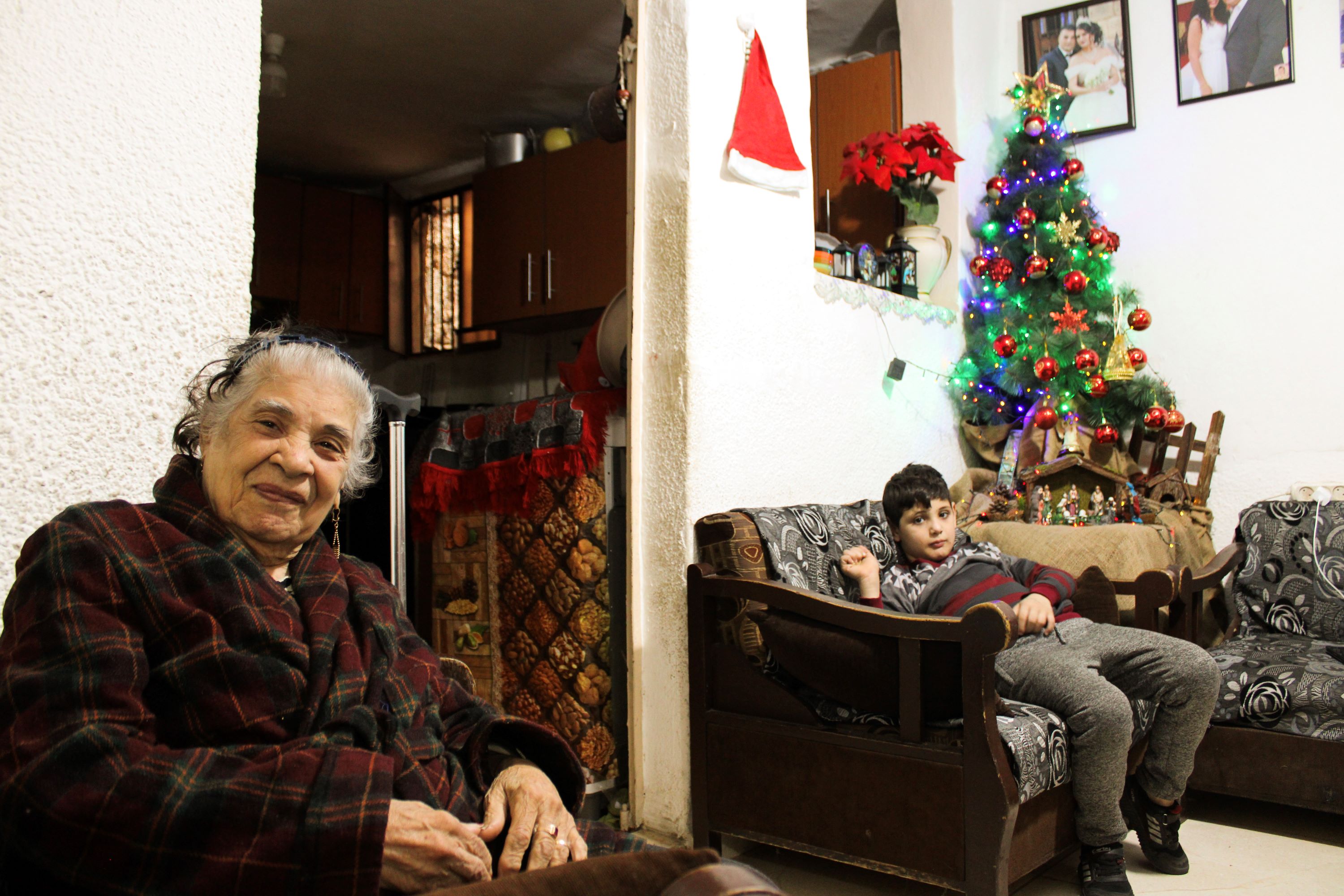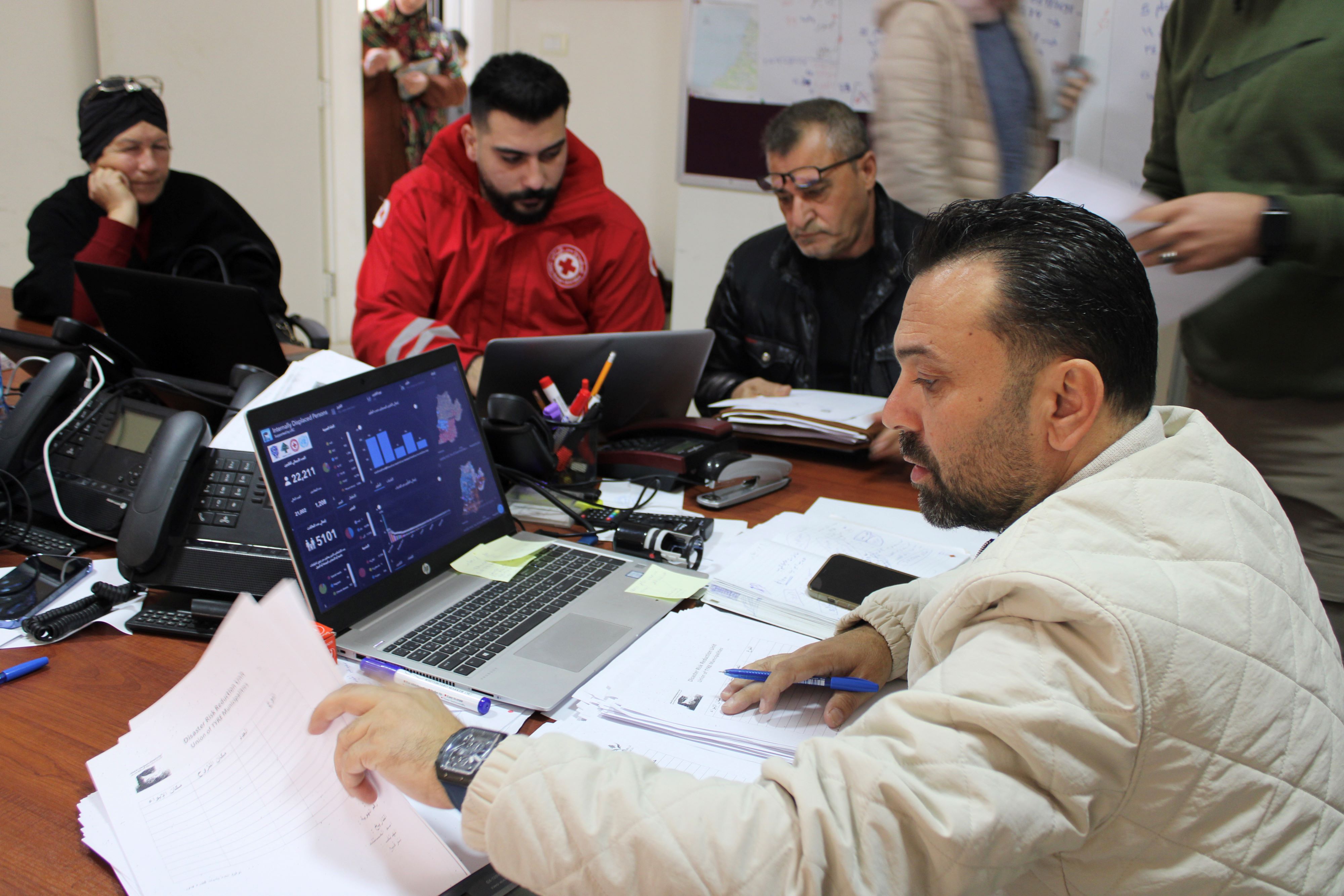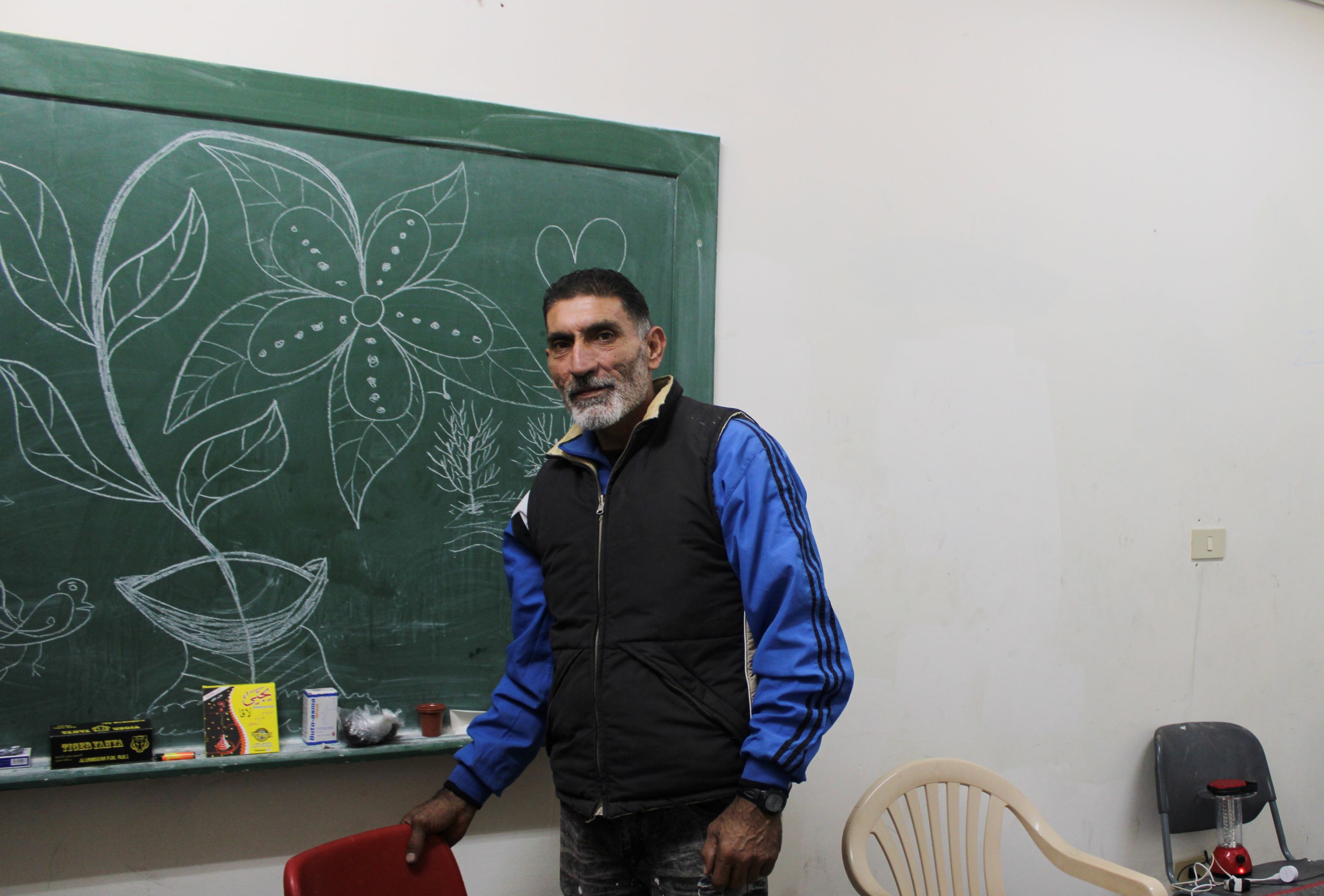Lebanon: In the south, Christmas arrives under the shadow of war

Two candles illuminate the church in Tyre with a dim glow. It is silent, besides the slow, soft chants of a prayer in Arabic.
At the start of the service, just a few members of the Maronite congregation sit in the pews.
Stay informed with MEE's newsletters
Sign up to get the latest alerts, insights and analysis, starting with Turkey Unpacked
The service will continue into the evening, when the quiet prayers will become Christmas hymns sung by children from the southern Lebanese city.
"We are praying for peace," Father Saab Yaacoub told Middle East Eye before the service began. About 20km south of Tyre, fighting is escalating between Israel and the Lebanese armed group Hezbollah.
Just hours before the service on Thursday, a woman was killed in an Israeli bombardment of her home in the border village of Maroun al-Ras. Her husband was severely injured.
Underneath the church is a Byzantine-era room that dates back to the second century. Its walls have withstood the test of time, the stones still stuck together despite earthquakes, floods and wars over nearly two thousand years.
Tyre is one of the oldest continually inhabited cities in the world. Thousands of years ago, around the ninth century BCE, the Phoenician port city was the most powerful in the Mediterranean, according to the book Tyre by archaeologist Ali Badawi.
According to local belief, Jesus is said to have strolled the city's streets, barefoot after his shoes were stolen. The city is also believed to have witnessed one of Jesus's miracles, when he cured a woman's daughter who had a devil inside her. The nearby village of Qana is where Jesus is said to have turned water into wine, his first miracle.
Tyre has also stood through millennia of conflict and conquest. It was occupied by the Egyptians, Romans, Crusaders, Ottomans, the French and, more recently, the Israelis in the 1980s.
Now another round of conflict is erupting outside the city's ancient walls, as Israel and Hezbollah exchange almost daily attacks. Although the violent exchanges between Israel and Hezbollah have been mostly restrained since 7 October, fears are growing that an "all-out" war may soon break out.
"We are praying for those under bombardment. Those living in the south [of Lebanon] and also those in Gaza," Father Yaacoub said.
Wartime anxiety
A minutes-walk from the church in Tyre's historic Christian quarter, 77-year-old Marie Haddad and her family are preparing for Christmas under the shadow of war. Marie told MEE she was anxious, and could hear the sounds of bombs and bullets not far away.
"We're scared they’ll strike Sour [the Arabic name for Tyre], maybe on Christmas," she said. "We pray to God to protect us."
Marie's family is one of about 540 Christian families, made up of Catholic (306), Maronite (170) and Orthodox denominations (65), who reside in the majority-Shia city, according to Tyre's mayor Hassan Dbouk.
Dbouk told Middle East Eye that Tyre is characterised by a "strong social fabric", home to people of different faiths who have lived beside one another for hundreds of years. He said that both Muslims and Christians alike would normally join the city's Christmas celebrations.
However, this year "the war in Gaza and in Lebanon has affected everything", he said, also noting the high number of "martyrs", or those who have died by the bombardment.
One of Marie's daughters, 51-year-old Ursula Jounia, sits beside a small Christmas tree, where underneath they have laid out a nativity scene.
"We are scared," she told MEE. "For now, everything has been okay in Sour - but Israel is getting closer, striking villages closer to us."
Although the violence in Lebanon's south has mostly been contained to areas along the border, some Israeli shelling has struck deeper. An Israeli drone strike in late October hit a location in the Iqlim al-Tuffah area, about 20km from the border demarcation line. Israeli strikes have also hit Qlaileh and Chaaitiyeh, towns just about 10km from Tyre.
Ursula said about a month ago her cousin's home in the border village of Rmaich was destroyed by an Israeli air strike. Most of her other family members who were living close to the border have fled their villages since the start of the fighting.
"We aren't happy. You feel that people are scared,” she said. However, she is grateful to be in her home, surrounded by her children. She said she would still prepare a feast for Christmas day, which will include meghli, a Lebanese rice pudding recipe made commonly around the holidays.
"Although we are anxious, we are trying to keep up the festive spirit inside our home," she said, glancing up at the twinkling lights around her tree.
Christmas left behind
Others in Tyre - including many who have been displaced from the fighting in the south - are not as lucky as Marie and her family. Joseph Mounir Kalaksh, 45, will not be able to spend Christmas with four of his daughters this year.
For over 68 days, home for Joseph, his wife and baby has been a small makeshift room pieced together with tarps inside a classroom in a school in Tyre. At the end of October, Joseph and his family fled the border village of Ramyeh, where they had been living for a few months before the war erupted.
Joseph's eldest four daughters, Joyce, Joel, Johanna and Josian, are now staying with their uncle in the Lebanese capital, Beirut, Joseph says, as he shows a photo of his girls.
Before the war, Joseph was working as a stone mason. But since he was displaced in the fighting, he has been out of work and cannot afford Christmas gifts for his daughters, nor the bus fees for him and his wife to reach Beirut.
"It is very hard. All of this shouldn't have happened to us," he says. "Moving from our homes and our land was very hard on us."
The Lebanese Red Cross (LRC) is currently supporting over 22,000 people, including over 5,000 families, who were displaced since the fighting started on October 8, according to Mortada Mhanna, the head of the Disaster Management Union in Tyre. Many, like Joseph, have been living for months in five displacement shelters in the city.
These families are only a fraction of the estimated 72,437 people in Lebanon who have been displaced since October, according to the International Organization for Migration (IOM).
Dozens of recently displaced families wait in line outside Mhanna’s office, eager to have him and his team help them register to receive food baskets. “These people lost their money, their treasured things, and their jobs. Almost two and a half months into this crisis, people are tired,” Mhanna says.
Mortada says that since the end to the ceasefire in Gaza on December 1, and since the fighting resumed on Lebanon’s border with Israel, an additional 7,000 people have fled the south and are asking for help from the Red Cross. With the influx of people, he says that there are “no places left in the shelters”, and they are struggling to provide enough food and blankets to the recently displaced.
Mhanna adds that since the end to the ceasefire in Gaza on 1 December, and since the fighting resumed on Lebanon's border with Israel, an additional 7,000 people have fled the south. With the influx of people, he says that there are "no places left in the shelters", and the union is struggling to provide enough food and blankets to the recently displaced.
Joseph shakes his head as he looks around the small room, barely large enough to fit the small table in its centre. For Christmas this year "there is no celebration", he said.
"Last year, there was a huge anticipation for the celebrations. But this year, nothing."
He recounts the Christmas festivities in the border village of Rmaich, where he was born and lived most of his life before moving to Ramyeh. "The bells would ring all day and all night. The whole village, the churches and the roads, were decorated with lights," he describes. "Inside our home we had a Christmas tree, with a manger underneath," he adds.
But this year, Joseph left his Christmas decorations behind.
'Resilience' of south
Joseph has covered the old school chalkboard in his room with drawings of flowers, trees and birds. The drawings, although sketched with simple white chalk, add vibrancy to the room enclosed by bland walls and tarp.
Joseph is also an artist: a sculptor. Within the 35 years he has been pursuing his craft, he has sculpted out of granite everything from ash trays to the Virgin Mary, he says. When he returns to his home, he looks forward to returning to his art.
At the Maronite church, the low drum of prayers continues. Their chants reverberate off the floors, the worshippers standing above the thousand-year-old room.
At the displacement shelter, Joseph says that his friends and family from the south have already lived through 34 days of war with Israel in 2006. He believes that they will also persevere through this war, like the walls of the ancient Byzantine room which have stood through tumultuous periods over millennia.
"Thankfully, the people of the south are resilient," Joseph said, turning to look at his chalk sketches.
With additional reporting by Yasmina Andary
Middle East Eye delivers independent and unrivalled coverage and analysis of the Middle East, North Africa and beyond. To learn more about republishing this content and the associated fees, please fill out this form. More about MEE can be found here.








